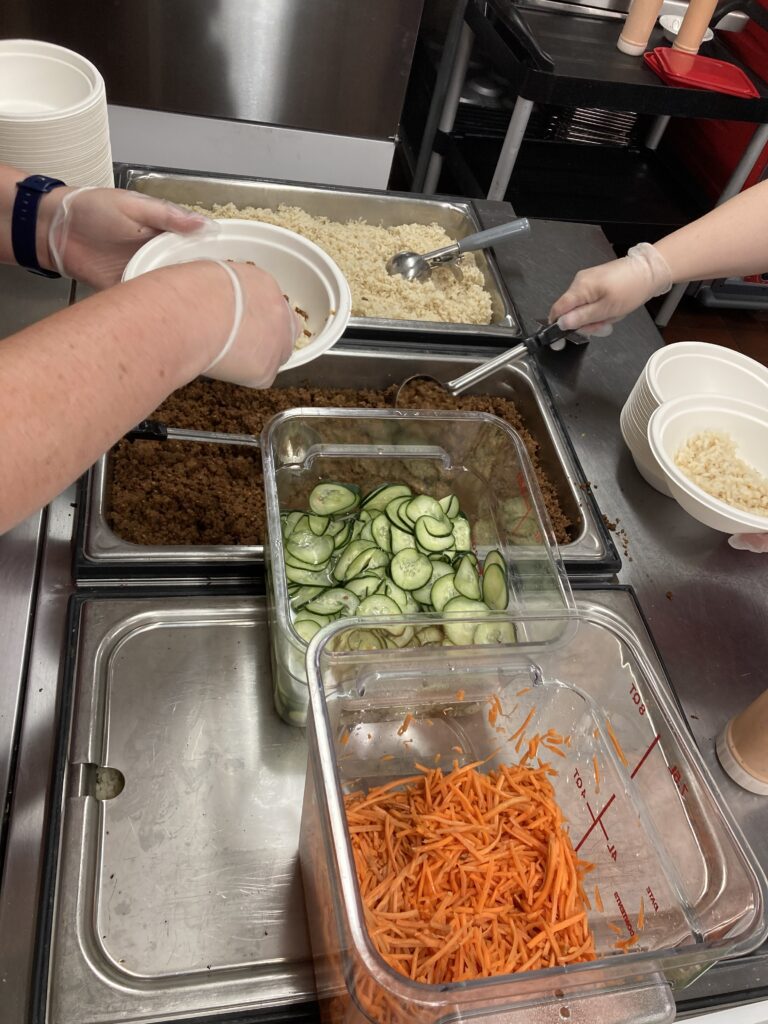From Heat-and-Serve to Homegrown: North Crawford School District’s Recipe for Success

Nestled in the rural heart of Crawford County, Wisconsin, North Crawford School District (NCSD) serves a small but resilient student population. With a child poverty rate of 18 percent, higher than the state average, the SFA recognized the critical role of school meals in student health and academic success. Through the Healthy Meals Incentive (HMI) funding, NCSD embarked on a transformative journey to overhaul its food service program – shifting from processed, heat-and-serve meals, to fresh, scratch-cooked, locally sourced offerings. As part of the HMI Initiative, Action for Healthy Kids (AFHK), in collaboration with the USDA’s Food and Nutrition Service (FNS), awarded 264 subgrants to School Food Authorities (SFAs) nationwide. These grants are designed to boost the nutritional value of school meals and expand nutrition education for students and families.
Before this grant, NCSD’s kitchens primarily operated as heat-and-serve facilities, relying heavily on prepackaged and processed foods. Despite having a dedicated nutrition team, the SFA lacked the training, resources, and infrastructure to implement a scratch-cooking model for its meals. It had a desire to balance student preferences with nutritional goals; however, limited staff experience with scratch cooking techniques, difficulty accessing culinary training and professional development, limited infrastructure for sustainability practices like composting and local sourcing made that difficult to achieve – until it received HMI funding.

With funding from HMI, NCSD was able to address these challenges and more! The district prioritized staff development by providing hands-on culinary training and menu development support through a partnership with Sustainable Kitchens. These trainings empowered staff to confidently prepare meals from scratch, replacing high-sugar items with healthier alternatives. Students were engaged throughout the process by participating in recipe development, taste tests, and even growing their own food! With HMI funding, NCSD purchased a hydroponic lettuce table, allowing agriculture students to grow and harvest lettuce that is served in the school’s salad bar. Composting initiatives were also introduced, with students learning to separate food waste and contribute to a sustainable food cycle.
The SFA also built strong relationships with local farmers, sourcing fresh beef, pork, and eggs from within the community. One example of an expanded partnership involved a school staff member and her husband – a school board member and local farmer – who donated fresh eggs and sausage to support the school meal program. These partnerships not only enhanced the quality of school meals but also deepened community investment in student wellness.
The results of these efforts are impressive. NCSD no longer serves any highly processed, pre-packaged meals in its school breakfast program. It emphasizes offering fresh fruits and cereals and yogurt that is lower in added sugars. These changes led to a 38 percent reduction in sugar content in the school breakfast program. Since implementing these changes, participation rates have remained strong, with 58-60 percent of students regularly eating breakfast at school.
Student engagement has been the cornerstone of the program’s success. From growing lettuce to shaping menus, students have had a voice in what they eat. Their feedback helped refine recipes and ensure meals are both nutritious and appealing. One standout example is NCSD’s now famous breakfast pizza, which features a whole-grain crust topped with turkey sausage, eggs, hashbrowns, and a low-sodium cheese sauce. This student favorite earned national recognition when it won a breakfast innovation competition hosted by J.T.M. Food Group at the School Nutrition Association (SNA) Annual National Conference (ANC) in Boston in 2024. As a result, Food Service Director Jen Kapinus was awarded a trip to the SNA Conference in San Antonio the following year – a testament to the SFA’s culinary creativity and commitment to excellence.
NCSD is committed to sustaining and expanding its HMI efforts. Plans include implementing breakfast in the classroom for middle school students and continuing to refine recipes and source food locally. As Food Service Director Kapinus shared:
“We’re … excited to keep going with this. [These were] changes we wanted to make permanently… We still have so much buy-in from people …[and] we haven’t lost the excitement to continue moving forward and continue to learn and see what’s working for us…”
Through strategic partnerships, staff training, and a deep commitment to the community, NCSD has transformed its school meals program into a model of health, sustainability, and student empowerment that will benefit students for years to come.
Find more HMI success stories in our Cafeteria Chronicles blog

This material is based upon work that is supported by the U.S. Department of Agriculture, Food and Nutrition Service. USDA is an equal opportunity provider, employer, and lender.
